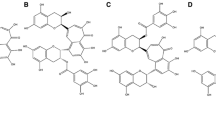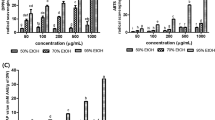Abstract
Backgrounds
Previous studies were mainly focused on the effect of catechins and caffeine, the main pharmacological ingredients of green tea. However, the ordinary way of taking green tea is by drinking the tea water. Hence the benefits of water extractives of green tea were investigated in the current study.
Methods
H2O2 was applied to induce the oxidative stress on PC12 cells. The neuroprotective effects of green tea against oxidative stress were determined by observing the biological behaviors of PC12 cells.
Results
With the pre-treatment of light green tea, the survival and proliferation of oxidative stressed PC12 cells were significantly enhanced. H2O2 induced PC12 cell apoptosis was completely reversed. Consistently, the expression of JNK was up-regulated while the caspase-3 was down-regulated.
Conclusion
These results suggested that drinking green tea, particularly the light green tea, performed neuroprotective effects against oxidative stress.
Similar content being viewed by others
References
Chen, L., Yao, M. Z., Wang, X. C., Yang, Y. J. & Chen, Z. M. Tea genetic resources in China. IJTS 8, 1–10 (2012).
Pervin, M. et al. Beneficial effects of green tea catechins on neurodegenerative diseases. Molecules 23, E1297 (2018).
Hayakawa, S., Oishi, Y., Tanabe, H., Isemura, M. & Suzuki, Y. Tea, Coffee and Health Benefits. in Bio-active Molecules in Food (eds Mérillon, J. M. & Ramawat, K.) 1–58 (Springer, Cham, Switzerland, 2018).
Khan, N. & Mukhtar, H. Tea polyphenols in promotion of human health. Nutrients 11, doi:https://doi.org/10.3390/nu11010039 (2018).
Almajano, M. P., Carbó, R., Jiménez, J. A. L. & Gordon, M. H. Antioxidant and antimicrobial activities of tea infusions. Food Chem 108, 55–63 (2007).
Mandel, S., Amit, T., Reznichenko, L., Weinreb, O. & Youdim, M. B. H. green tea catechins as brain-permeable, natural iron chelators-antioxidants for the treatment of neurodegenerative disorders. Mol Nutr Food Res 50, 229–234 (2006).
Tipoe, G. L., Tung-Ming, L., Ming-Wai, H. & Man-Lung, F. Green tea polyphenols as an anti-oxidant and anti-inflammatory agent for cardiovascular protection. Cardiovasc Haematol Disord Drug Targets 7, 135–144 (2007).
Kakuda, T. Neuroprotective effects of the green tea components theanine and catechins. Biol Pharm Bull 25, 1513–1518 (2002).
Weinreb, O., Mandel, S., Amit, T. & Youdim, M. B. Neurological mechanisms of green tea polyphenols in Alzheimer’s and Parkinson’s diseases. J Nutr Biochem 15, 506–516 (2004).
Caruana, M. & Vassallo, N. Tea polyphenols in Parkinson’s disease. Adv Exp Med Biol 863, 117–137 (2015).
Mandel, S. A., Amit, T., Weinreb, O., Reznichenko, L. & Youdim, M. B. Simultaneous manipulation of multiple brain targets by green tea catechins: a potential neuroprotective strategy for Alzheimer and Parkinson diseases. CNS Neurosci Ther 14, 352–365 (2008).
Sosa, P. M., de Souza, M. A. & Mello-Carpes, P. B. Green tea and red tea from camellia sinensis partially prevented the motor deficits and striatal oxidative damage induced by hemorrhagic stroke in rats. Neural Plast 2018, 5158724–5158731 (2018).
Bagyinszky, E. et al. Role of inflammatory molecules in the Alzheimer’s disease progression and diagnosis. J Neurol Sci 376, 242–254 (2017).
Choi, Y. T. et al. The green tea polyphenol (-)-epigallo-catechin gallate attenuates β-amyloid-induced neurotoxicity in cultured hippocampal neurons. Life Sci 70, 603–614 (2001).
Mandel, S., Reznichenko, L., Amit, T. & Youdim, M. B. Green tea polyphenol (-)-epigallocatechin-3-gal-late protects rat PC12 cells from apoptosis induced by serum withdrawal independent of P13-Akt pathway. Neurotox Res 5, 419–424 (2003).
Luczaj, W., Waszkiewicz, E., Skrzydlewska, E. & Roszkowska-Jakimiec, W. Green tea protection against age-dependent ethanol-induced oxidative stress. J Tox-icol Environ Health A 67, 595–606 (2004).
Qin, Y. J. et al. Green tea extract treatment alleviates ocular inflammation in a rat model of endotoxin-induced uveitis. PLoS One 9, e103995 (2014).
On, C. K. et al. Green tea catechins and their oxidative protection in the rat eye. J Agric Food Chem 58, 1523–1534 (2010).
Yang, Y. et al. Thrombin-induced microglial activation impairs hippocampal neurogenesis and spatial memory ability in mice. Behav Brain Funct 11, 30–40 (2015).
Mailly, F., Marin, P., Israël, M., Glowinski, J., Prémont, J. Increase in external glutamate and NMDA receptor activation contribute to H2O2-induced neuronal apopto-sis. J Neurochem 73, 1181–1188 (1999).
Yu, J. et al. Fucoxanthin prevents H2O2-induced neuronal apoptosis via concurrently activating the PI3-K/Akt cascade and inhibiting the ERK pathway. Food Nutr Res 61, 1304678 (2017).
Zhang, J. et al. Hypoxia-regulated neurotrophin-3 expression by multicopy hypoxia response elements reduces apoptosis in PC12 cells. Int J Mol Med 30, 1173–1179 (2012).
Jiao, Q. et al. Cell-cell connection enhances proliferation and neuronal differentiation of rat embryonic neural stem/progenitor cells. Front Cell Neurosci 11, 200–211 (2017).
Reimann-Philipp, U., Ovase, R., Weigel, P. H. & Grammas, P. Mechanisms of cell death in primary cortical neurons and PC12 cells. J Neurosci Res 64, 654–660 (2001).
Lee, J. H. et al. (-)-Epigallocatechin gallate attenuates glutamate-induced cytotoxicity via intracellular Ca modulation in PC12 cells. Clin Exp Pharmacol Physiol 31, 530–536 (2004).
Yoo, K. Y. et al. (-)-Epigallocatechin-3-gallate increases cell proliferation and neuroblasts in the subgranular zone of the dentate gyrus in adult mice. Phytother Res 24, 1065–1070 (2010).
Yang, Y. et al. Green tea catechins are potent anti-ox-idants that ameliorate sodium iodate-induced retinal degeneration in rats. Sci Rep 6, 29546–29555 (2016).
Assuncao, M., Santos-Marques, M. J., Carvalho, F. & Andrade, J. P. Green tea averts age-dependent decline of hippocampal signaling systems related to antioxidant defenses and survival. Free Radic Biol Med 48, 831–838 (2010).
Wang, L. Y., Li, X. & Han, Y. Z. Neuroprotection by epigallo catechin gallate against bupivacaine anesthesia induced toxicity involves modulation of PI3/Akt/PTEN signalling in N2a and SH-SY5Y cells. Int J Clin Exp Med 8, 15065–15075 (2015).
Ortiz-LóPez, L. et al. Green tea compound epigallo-cat-echin-3-gallate (EGCG) increases neuronal survival in adult hippocampal neurogenesis in vivo and in vitro. Neuroscience 322, 208–220 (2016).
Levites, Y., Youdim, M. B. H., Maor, G. & Mandel, S. Attenuation of 6-hydroxydopamine (6-OHDA)-in-duced nuclear factor-kappaB (NF-κB) activation and cell death by tea extracts in neuronal cultures. Biochem Pharmacol 63, 21–29 (2002).
Suzuki, M., Tabuchi, M., Ikeda, M., Umegaki, K. & Tomita, T. Protective effects of green tea catechins on cerebral ischemic damage. Med Sci Monit 10, BR166–174 (2004).
Weinreb, O., Mandel, S. & Youdim, M. B. Gene and protein expression profiles of anti- and pro-apoptotic actions of dopamine, R-apomorphine, green tea polyphenol (-)-epigallocatechine-3-gallate, and melatonin. Ann N Y Acad Sci 993, 351–361 (2003).
Acknowledgements
This study was supported by grants from the National Natural Science Foundation of China (81571205 and 81870981).
Author information
Authors and Affiliations
Corresponding authors
Additional information
Conflict of Interest
Zhenlu Cai, Xiaoxuan Hu, Ruolan Tan, Yunran Feng, Meiqi Sun, Ning Ma, Xingxing Li, Li Huang, Jing An, Qian Ge and Haixia Lu declare that they have no conflict of interest.
Human and animal rights
The article does not contain any studies with human and animal and this study was performed following institutional and national guidelines.
Rights and permissions
About this article
Cite this article
Cai, Z., Hu, X., Tan, R. et al. Neuroprotective effect of green tea extractives against oxidative stress by enhancing the survival and proliferation of PC12 cells. Mol. Cell. Toxicol. 15, 391–397 (2019). https://doi.org/10.1007/s13273-019-0042-8
Received:
Accepted:
Published:
Issue Date:
DOI: https://doi.org/10.1007/s13273-019-0042-8




